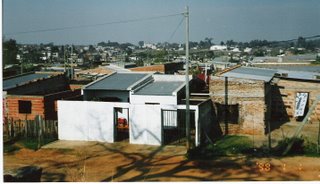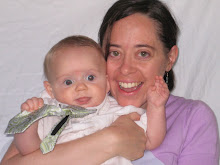why poverty
As I promised in my first post, I will now expulge (not sure if that is a word, but it sounds pretty awesome to me) the reasons behind my interest in poverty.
I grew up with the "idea" of poverty as close to me as a picture or the television could get. I knew what poverty was as a definition, I saw pictures of children starving in Africa, and I felt some desire to help, but it was something too far out of my reach--out of my world. I am guessing I don't need to even explain my background because my background is pretty much explained by the fact that I am blogging. Who else would take the time and have the resources to blog?
Back to poverty...so then, at the age of 21, I went to Argentina to spend 18 months as a service volunteer for my church (ie: I was a missionary). I trudged around the dirt roads and green fields of Argentina, sharing my life for a brief moment with so many other people I won't ever see again. It was an amazing experience, but one of the most poignant parts was that of seeing poverty--coming face-to-face with what I had seen in pictures and on television. There I was, amid tin sheets balanced against each other for shelter. Human waste was thrown out onto the same dirt roads I was trodding down, and dogs with horrible diseases that were deforming them and taking away their hair and limbs hobbled alongside of me. But it was the people that were indeliably impressed on my mind. Wrinkled skin, dirty fingernails, and matted hair were just the beginning. Odds and ends of clothing were piled on bodies in the winter until it was hard to see what shape the person was. Hollowed eyes stared back at me, and smiles full of missing teeth grinned at me. That was the physical reality. The psychological reality was families not knowing where their next meal was coming from, not knowing IF their next meal would come. Not all Argentines lived like this; only those in the so-called "villas de miseria," meaning villages of misery. I was not only scared of what I didn't know, I was scared of the hate and depression that took over many people in these areas. I could feel it. It was heavy. I hated it. (the picture is of one of the areas I served in as a missionary, in Concordia, Argentina)
 My experience in Argentina was a beginning in many ways. I had now seen poverty, and I did not like it. Not because people didn't have money, but because people were downtrodden, depressed, hateful, and learned to lie. To me. (Wasn't I there to help them?) I tried to help them as a missionary, and in many ways I was able to help them. Giving them hope through the plan of salvation is the best motivation for change I have seen. But I want to keep working, helping them CHANGE.
My experience in Argentina was a beginning in many ways. I had now seen poverty, and I did not like it. Not because people didn't have money, but because people were downtrodden, depressed, hateful, and learned to lie. To me. (Wasn't I there to help them?) I tried to help them as a missionary, and in many ways I was able to help them. Giving them hope through the plan of salvation is the best motivation for change I have seen. But I want to keep working, helping them CHANGE.
I started my current MPA degree with the desire to help through microfinance. After a year and an internship, I am not so crazy about microfinance, but I am looking at other ways to help. Or maybe other ways that involve microfinance.
Which brings me to this blog. It has been three years now since I have returned from Argentina. It is sometimes hard to remember those experiences as vividly as I would like to. I am a student, studying about all these things, and I sometimes feel like I am as I was before Argentina, looking at pictures, talking about problems, and all these problems are going on around me. I want to act...but I need to prepare. So this is my way of acting for right now.
I grew up with the "idea" of poverty as close to me as a picture or the television could get. I knew what poverty was as a definition, I saw pictures of children starving in Africa, and I felt some desire to help, but it was something too far out of my reach--out of my world. I am guessing I don't need to even explain my background because my background is pretty much explained by the fact that I am blogging. Who else would take the time and have the resources to blog?
Back to poverty...so then, at the age of 21, I went to Argentina to spend 18 months as a service volunteer for my church (ie: I was a missionary). I trudged around the dirt roads and green fields of Argentina, sharing my life for a brief moment with so many other people I won't ever see again. It was an amazing experience, but one of the most poignant parts was that of seeing poverty--coming face-to-face with what I had seen in pictures and on television. There I was, amid tin sheets balanced against each other for shelter. Human waste was thrown out onto the same dirt roads I was trodding down, and dogs with horrible diseases that were deforming them and taking away their hair and limbs hobbled alongside of me. But it was the people that were indeliably impressed on my mind. Wrinkled skin, dirty fingernails, and matted hair were just the beginning. Odds and ends of clothing were piled on bodies in the winter until it was hard to see what shape the person was. Hollowed eyes stared back at me, and smiles full of missing teeth grinned at me. That was the physical reality. The psychological reality was families not knowing where their next meal was coming from, not knowing IF their next meal would come. Not all Argentines lived like this; only those in the so-called "villas de miseria," meaning villages of misery. I was not only scared of what I didn't know, I was scared of the hate and depression that took over many people in these areas. I could feel it. It was heavy. I hated it. (the picture is of one of the areas I served in as a missionary, in Concordia, Argentina)
 My experience in Argentina was a beginning in many ways. I had now seen poverty, and I did not like it. Not because people didn't have money, but because people were downtrodden, depressed, hateful, and learned to lie. To me. (Wasn't I there to help them?) I tried to help them as a missionary, and in many ways I was able to help them. Giving them hope through the plan of salvation is the best motivation for change I have seen. But I want to keep working, helping them CHANGE.
My experience in Argentina was a beginning in many ways. I had now seen poverty, and I did not like it. Not because people didn't have money, but because people were downtrodden, depressed, hateful, and learned to lie. To me. (Wasn't I there to help them?) I tried to help them as a missionary, and in many ways I was able to help them. Giving them hope through the plan of salvation is the best motivation for change I have seen. But I want to keep working, helping them CHANGE. I started my current MPA degree with the desire to help through microfinance. After a year and an internship, I am not so crazy about microfinance, but I am looking at other ways to help. Or maybe other ways that involve microfinance.
Which brings me to this blog. It has been three years now since I have returned from Argentina. It is sometimes hard to remember those experiences as vividly as I would like to. I am a student, studying about all these things, and I sometimes feel like I am as I was before Argentina, looking at pictures, talking about problems, and all these problems are going on around me. I want to act...but I need to prepare. So this is my way of acting for right now.


1 Comments:
T:
La pobreza se percibe en tres niveles:
1. Se "ve"
2. Se "siente"
3. Se "vive"
Si la pobreza se "ve" solo se percibe en el momento, por lo que rapidamente se olvida.
Si la pobreza se "siente", entonces perdura y cala en el alma, se instala en la mente, grita, sacude y razona. El sentimiento se abre paso y se transforma en analisis tratando de resolver.
Si la pobreza se "vive", se clava muy dentro, inutiliza, duele y destruye.
Por eso no existe mejor persona para resolver la pobreza como el que la "siente" junto con el que la ha vivido pero que la ha vencido. Desafiar a la pobreza no es cosa facil, es una labor titanica y casi imposible.
En lo que a mi respecta, me encuentro en el mismo barco que tu, sintiendo lo mismo que tu: "I could feel it. It was heavy. I hated it"
Exito en tu blog, exito en tu busqueda!
GC
Post a Comment
<< Home